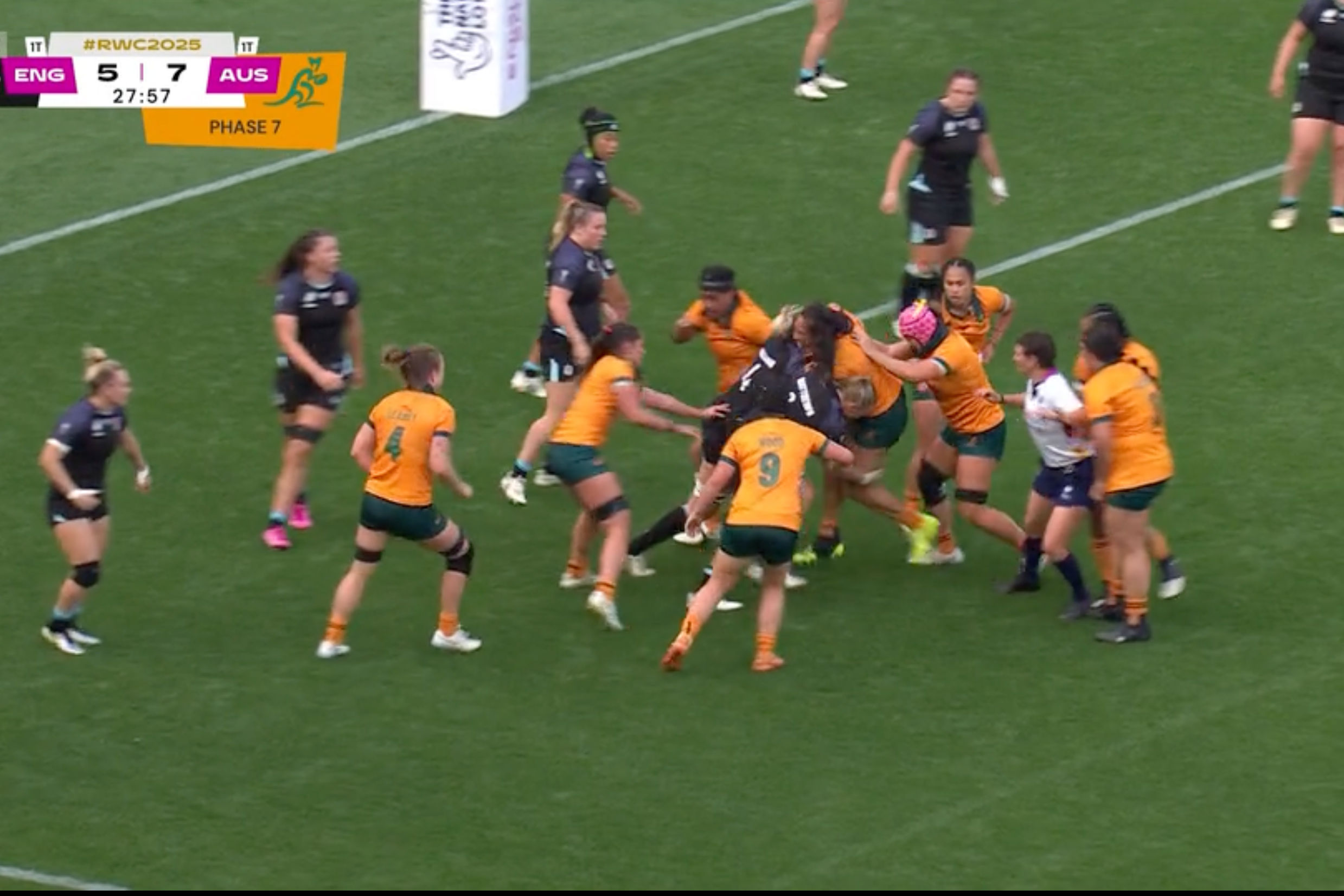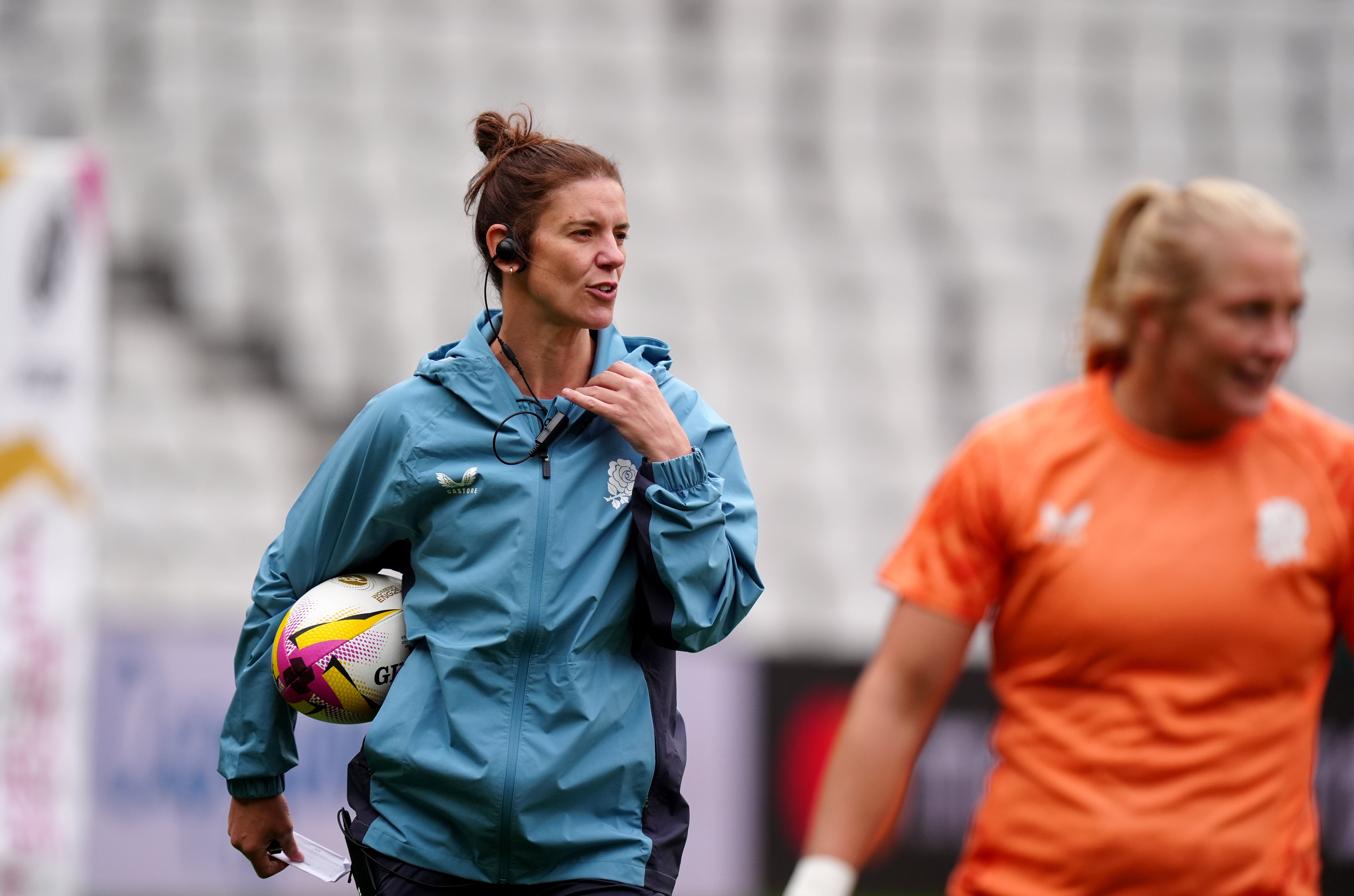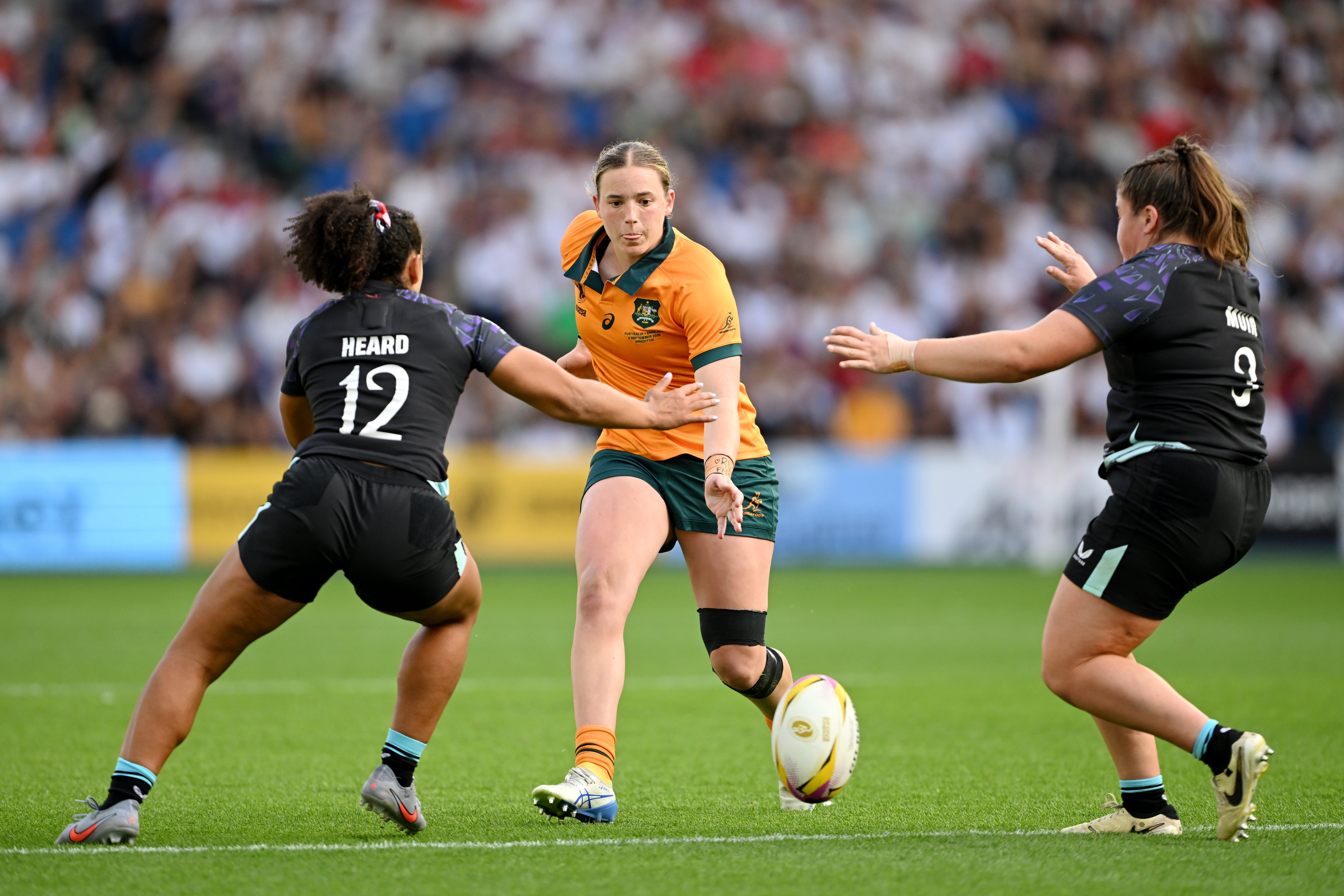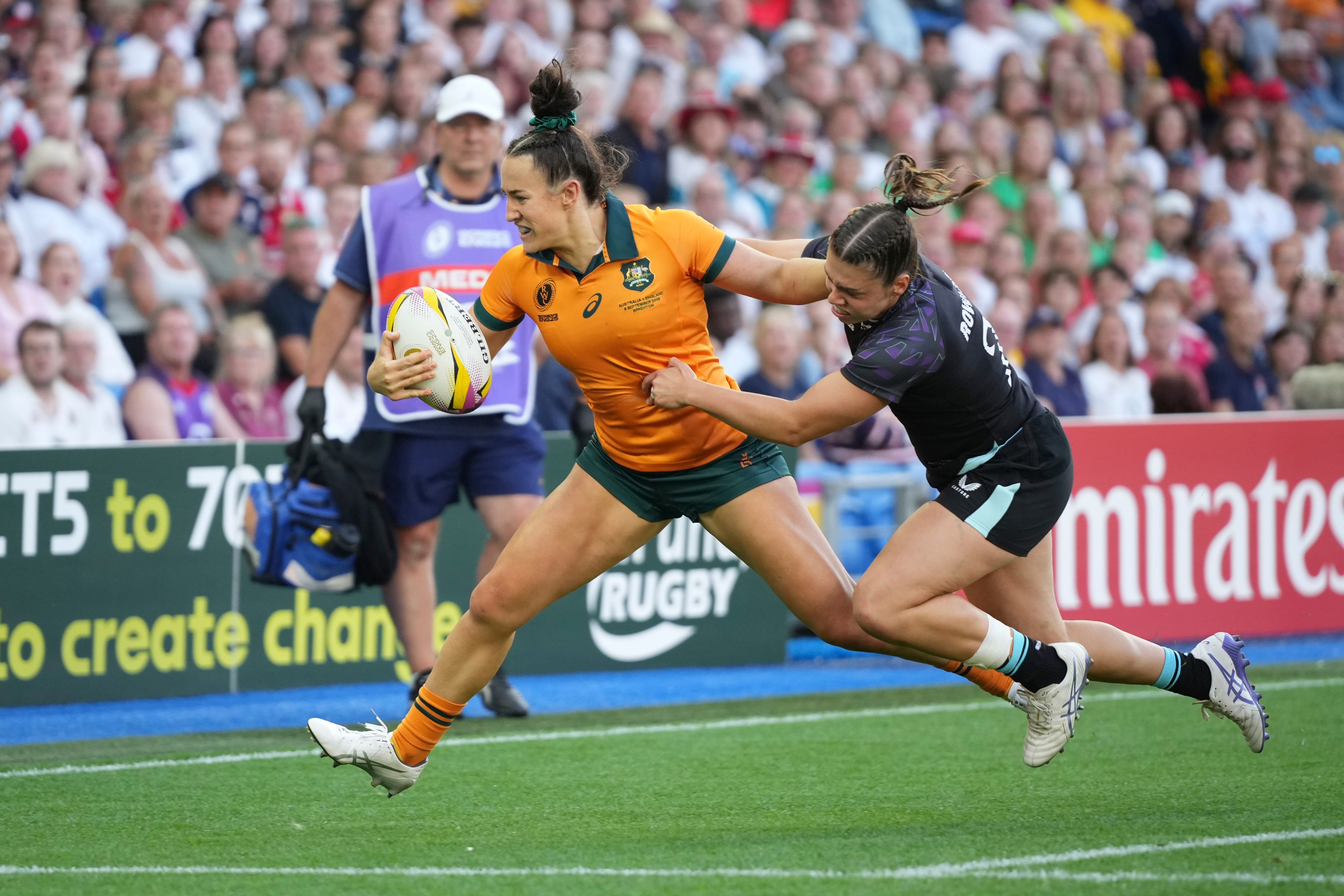It was about an hour after England had wrapped up an unbeaten Pool A campaign with a 47-7 victory over Australia that vice-captain Meg Jones uttered one of sport’s immutable truths. “We know defence is going to win championships,” the centre underscored, an adaptation of Bear Bryant’s old American football adage becoming a familiar refrain at the Red Roses’ World Cup.
For all of the gaudy scores, scintillating attacking rugby and meaty mauls that England have and will produce across the tournament, the message has been clear that tournament triumph will not be achieved unless founded on the foundations of a rock-solid defensive structure. It is rare to see England tested as rigorously in that regard as they were on Saturday evening by Australia – but despite their set-piece faltering and plenty of issues dealing with the Wallaroos’ smart use of the boot, the Red Roses held firm aside from Adani Talakai’s score from a lineout drive.
“I thought our defence was outstanding tonight,” head coach John Mitchell said afterwards, with England conceding a combined 17 points so far. “Sometimes your attack doesn't necessarily go for you all the time and at times we were a bit ugly in attack, and that's something within our own control, but I thought our defence was outstanding."
No doubt, Australia found ways of exploiting England that will give their true tournament rivals hope henceforth, but in the 22, the so-called “red zone”, they were unable to run through the Red Roses’ ramparts. Prop Eva Karpani was held up by Abbie Ward, with a bit of help from Hannah Botterman and Sadia Kabeya, while a mighty double tackle from captain Alex Matthews and Rosie Galligan on Australia skipper Siokapesi Palu on the 28-minute mark was a defining moment in another goalline stand that afforded England the platform from which they powered away. Six Australian visits to England’s 22 in the opening half-hour produced just seven points.

In a sign of how big a blow her potential absence from the quarter-final could be, Botterman made 11 tackles in 24 minutes before her removal due to a back spasm. The increasingly important Morwenna Talling, who will be available for the clash with Scotland in the last eight after passing a head injury assessment late on, has now made 40 tackles at this tournament without missing a single one.
That defensive improvement is important given the frailties shown both here and in the grand slam game against France at the end of the Six Nations. That second half at Twickenham prompted frustration for Mitchell as England threatened to throw away a huge lead with their edge defence particularly error-ridden – an area of vast improvement so far at this World Cup, admittedly against less incisive opposition. It has been a huge help to have defence coach Sarah Hunter back from maternity leave; the former England captain is a key figure in Mitchell’s staff with real gravitas and tactical nous.
“When Sunts speaks, people listen,” Jones explained. “She’s really clear in the communication that she has and we trust her massively. Whatever she says goes, and we back it as much as we can. We asked for some fight, we asked for us to show a bit of pride in our defence, and I think we showed that in abundance. It’s going to win games for us.”

A 93% tackle success rate compared to Australia’s 74% is evidence of the difference between the two sides that eventually told, even if a 47-7 scoreline felt an unfair reflection of the Wallaroos’ early ascendancy. The manner in which they managed to manipulate England’s backfield was striking, though. The Red Roses seldom face sides with the kicking threat possessed by Faitala Moleka and Caitlyn Halse, and Ellie Kildunne endured one of her poorer games as she struggled to combat the pair’s ability to manufacture territory. Two 50:22s in the first half were evidence that England had got things slightly wrong.
“I didn’t think Ellie anticipated ahead of the ball,” Mitchell said. “I think she stayed too much inside the ball, so gave them space. It’s an easy thing to address.”

Kildunne’s almost certain absence from the quarter-final will prompt a decision at full-back. Helena Rowland provided a steadying backfield presence off the bench and is such a valuable figure given her dynamism and capacity to cover anywhere from 10 to 15, but Emma Sing’s skillset could see the Gloucester-Hartpury full-back come into the mix, too. It may be that, despite Zoe Harrison continuing to have a fine tournament, Mitchell looks to Holly Aitchison at fly half to start the quarter-final – the playmaker perhaps needs more minutes after an injury-disrupted tournament, while her distributing game could help unlock an England attack that made 16 “bad passes”, according to the official tournament stats. Sing’s world-class ability off the tee could be valuable if Aitchison, who has worked hard on her kicking but is not at Harrison’s level, is preferred.

The time for rotation elsewhere is probably over, even if chances of a Scotland success are minimal. The hope is that captain Zoe Aldcroft will be fit and raring to go, which will probably see Talling return to the second row. Botterman’s back could force a change at loosehead, where converted tighthead Kelsey Clifford produced probably her best England performance yet off the bench. A meeting with Scotland, who have been impressive at this tournament given the context of the contractual chaos within which they entered it, will again see England tested by Helen Nelson’s cultured right boot and the edge threat provided by flying wings Francesca McGhie and Rhona Lloyd.
“Scotland have played really well in this tournament,” Mitchell said. “Considering what they’ve had to experience with the contract conditions, they are doing a remarkable job. They’ve slightly changed their game from the Six Nations. There is some opportunity there that we will look to exploit.
“Just like we did tonight, we took away all of Australia’s edges and then their nine and 10 tried to kick through us. Scotland play quite similarly. We’ll see what we get.”
Ellie Kildunne set to miss England’s World Cup quarter-final after suffering head injury
Women’s Rugby World Cup 2025 fixtures: Full schedule, results and kick-off times
Who and when do England play next? The Red Roses’ route to 2025 Women’s World Cup final
Who are the Red Roses? Player-by-player guide to England’s Rugby World Cup squad
Scotland loom for England at Women’s World Cup after valiant defeat to Canada







